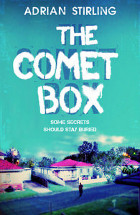The comet box by Adrian Stirling

Penguin, 2011. ISBN 9780143206101.
Teenaged readers will have little knowledge of 1986 when Halley's
Comet
captured the imagination of Australians. Adrian Stirling transports
all
of his readers however, when describing simple suburban life for an
average working-class family living in Geelong.
Narrating from a fourteen year old boy's perspective, the character
Andrew conveys a clear sense of wholesome security when describing
his
simple, predictable and essentially boring life. When Andrew's older
sister Amelia leaves home without trace, his family undergoes
massive
upheaval and distress as they express shock, anger and fear.
Whilst pivotal to the story, this is merely one traumatic family
event
experienced within the community and for Andrew it is significant
because it causes him to question the behaviour and motivation of
adults. Readers might question Andrew's naivety when viewed against
contemporary adolescents. I don't believe it is mere wistfulness
however which causes me to remember a time where demands on children
were fewer and they were somehow more protected from the harsher
aspects of life.
Andrew senses that his parents are not being open with him regarding
Amelia's disappearance and in a relatively short time, he discovers
that other families are hiding similar unpalatable secrets. When
Amelia
is discovered by Queensland Police and returned, Andrew's home life
becomes even more disrupted and yet he is still kept ignorant of the
full details by those involved.
The central tale is expanded by vignettes involving friends,
neighbours
and an arrogant, dominating grandfather which collectively
contribute
to Andrew's emotional development. The lives and experiences
described
reflect everyday human flaws and the reader is left feeling sorry
for a
'good kid' who discovers unpleasant aspects of life without the
benefit
of guidance by parents who are otherwise preoccupied.
Halley's Comet places the story in recent history yet also marks the
passage of time in overall human experience, coming predictably
every
seventy five years.
What is initially presented as an event which stirs the dreams of
both
children and adults gradually loses importance in the lives of the
struggling characters. This is very real, yet it was symbolic to me
that human dramas count for nothing as the comet navigates the
wildly
complex celestial time piece and that no matter how bad things are,
the
sun really will come up in the morning.
Rob Welsh